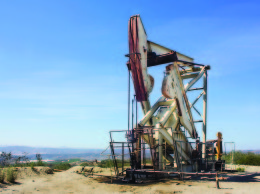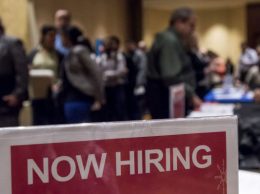We believe that climate change is a serious threat to the global economy and that human activity is a significant contributor to global warming. We believe that significant policy changes about how we obtain and use energy will be required to reduce the human impact on climate change.
But we also believe that market-based solutions put into place on a state, regional, national and global basis are the best way to reverse that impact. Which brings us to Santa Barbara County’s Measure P, an initiative that would ban certain fracking and other “high intensity” oil and gas operations in the county. After airing a considerable amount of debate on these pages during the past few weeks, we are recommending a vote against this ballot initiative.
Our first reason is the lack of clarity in the language of the ballot measure. Already taxpayer dollars have been spent for Santa Barbara County planning staff to examine and offer in advance an interpretation of what the ballot measure would mean for existing oil and gas operations if it were to pass. We are concerned that if passed, Measure P, will require tremendous resources as county staff, third-party experts and the courts try to understand what it really means.
Second is the potential negative impact on Santa Barbara County’s budget. The county was blindsided by the negative impact of the recession on revenue, which triggered some $80 million in cuts. The county is just now recovering from those cuts, and its pension plan is severely underfunded. Firefighters, law enforcement personnel and some top teachers have come out against Measure P.
Third, there is the issue of duplication of effort. Santa Barbara County has approved an ordinance that imposes an extra level of regulation on fracking. That ordinance has just gone into effect, but it has not been tested. It seems to us that letting the fracking rules play out makes more sense than heading down an uncertain path.
Fourth, we also resent the fact that proponents of Measure P have turned the debate into an up-or-down vote on the question of climate change. They have tried to link well-thought-out positions by our local chambers of commerce to those of climate-change skeptics or climate-change deniers.
Finally, we’d offer that Santa Barbara County has done a very good job on the climate front. The county’s emPower program is being cloned in Ventura and San Luis Obispo counties, a major new utility-scale solar power station in the Cuyama Valley has been approved, and the county has not been shy about imposing tough restrictions on new development.
The bottom line on Measure P is that Santa Barbara County’s supervisors, accountable to the voters every four years, have been responsible parties when it comes to climate rules. Let’s give them the leeway to keep doing their jobs.






 Print
Print Email
Email


















The oil companies have been spending millions of dollars to misinform about Measure P. It does not and cannot shut down existing oil production. It applies only to future wells using specific, high-intensity techniques.
Firstly, it is not unclear at all as to what it means for existing operations. As Linda Krop, lead lawyer for EDC explained at a recent public forum, “Any new regulation only operates prospectively, and cannot apply to operations that are currently legal and permitted….The Fiscal Impact Statement prepared by the County Auditor confirms that …existing operations won’t be shut down, and (2) new conventional oil and gas production methods won’t be prohibited.”
The initiative was drafted by a top legislative firm in the state and reviewed by numerous law firms including EDC and Stanford Law and is endorsed by state and local legislators and four former county supervisors who are familiar with legal language.
Opponents of Measure P are making this completely baseless claim because they don’t want to debate the real issue, which is whether or not we want massive new oil operations — thousands of new wells — using extreme techniques like fracking,acidizing and steam injection in our County or not?
Secondly, Measure P WILL NOT impact county funding. The County said it would have no immediate impact on oil property taxes. We don’t have an oil extraction tax so all we get from oil companies is what they pay in property tax — which makes up 0.7% at most of the overall county budget. This was confirmed with the County Auditor.
We are likely losing money on the oil industry currently as its costly in terms of road maintenance, emergency response, environmental damage, etc. What’s more –extreme extraction could drive down property values and taxes for everyone else, and hurt the rest of our economy! Our county revenues are actually BETTER OFF if Measure P passes
Thirdly, the county “regulation” on fracking is simply that they now need a permit. It is not currently prohibited in the County. If you don’t want fracking in the County, there is only one way to ensure it doesn’t happen — VOTE YES ON MEASURE P.
Finally, Measure P is an up-and-down vote on climate change because the oil extraction they want to do here is the most carbon-intensive form of extraction in the world. One recent 136-well project approved would produce emissions equivalent to adding 17,000+ cars to county roads. It would instantly be one of the largest sources of greenhouse gas emissions in the county.
What’s more, after that 136-well project was approved, that company has said they want to drill 7000+ wells. That would be equivalent to adding one million cars to county roads. That is just to get the oil out of the ground and doesn’t include transporting, refining or burning that oil.
There is simply no way to offset that level of emissions no matter how wildly successful programs like emPower are. We could put solar on every roof in town and remove all gas cars in the entire county and emissions would still rise.
Nor would we see those kinds of changes because if the oil industry grows in that way so will their political influence, and we will not get the kind of policies we would need to transition to cleaner sources of energy and reduce emissions.
A dirty oil boom in Santa Barbara County and in California as a whole will set back California’s ability to take the lead on climate change — just as the tarsands boom in Canada has reversed their previous leadership on the issue.
As the country with the largest per capita emissions in the world, the United States must get serious about addressing climate change if we are to not face truly catastrophic impacts, and if California doesn’t lead the U.S, what state will?